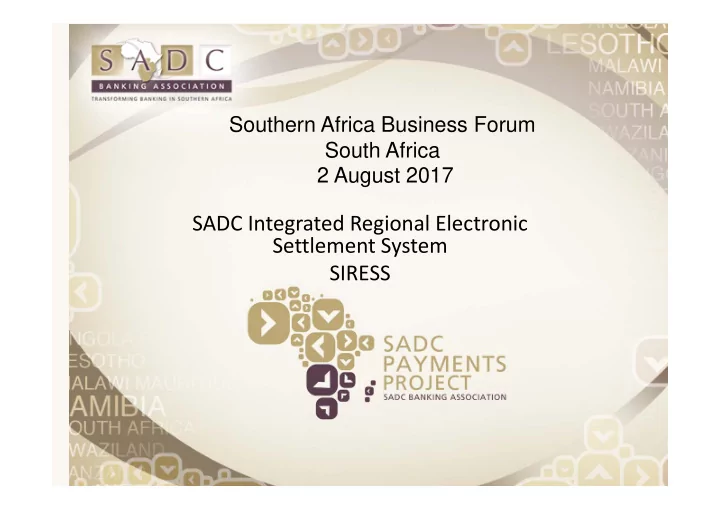

Southern Africa Business Forum South Africa 2 August 2017 SADC Integrated Regional Electronic Settlement System SIRESS
Finance and Investment Protocol
Outline • Who are we • The SIRESS journey – • Governance structure • Benefits • Latest figures on SIRESS
Who are we • The SADC Banking Association (SADC BA) is a recognised structure of the CCBG created in 1998. • Represented by 13 member associations on its board – membership is voluntary • Secretariat hosted by Banking Association South Africa (BASA) • Registered in SA under the Companies Act
Source: SADC Banking Association SET UP AND REPORTING STRUCTURE OF THE SADC-BA SADC HEADS OF STATE SADC Committee of Ministers of Finance Mandated by the Finance and Investment Protocol (FIP) & overseen by SADC Secretariat SADC Committee of Senior Treasury Officials SADC Banking Association Member Countries Office of the Committee of Central Bank Governors in Represented by their Banking CCBG SADC (CCBG) Associations (CCBO) Secretariat (RSA) Exchange Control Sub- Angola Namibia Comm. Botswana Swaziland Payments DRC Tanzania Banking Sub-Comm. Supervision Sub-Comm. Lesotho Zambia Malawi Zimbabwe Fin. Markets Payments Sub-Comm. Madagascar Mauritius RSA System Project Mozambique Seychelles
SADC Payment System Project CCBG Payments Project Vision In terms of the SADC Finance Investment Protocol, and in particular Annex 6, the Committee of Central Bank Governors (CCBG) has undertaken to, amongst other things, facilitate cross border payments in SADC. To this end the SADC Payments System Committee as the CCBG group responsible for payment systems, initiated a process to develop a framework for an integrated regional payment environment. Each SADC country has : – An efficient and effective payment system Internationally acceptable Interlinked within the region Supporting the SADC aims of : – Intra SADC trade
What is SIRESS SADC Integrated Regional Electronic Settlement System (SIRESS)- (RTGS) (Swaziland) Single settlement currency system - ZAR (Rand) Operated by the SARB as appointed by the participating Central Banks Cross border transactions only SWIFT FINCopy Service Market Infrastructure Close User Group Settlement accounts will operate on a pre-funded basis July 2013 – CMA countries High value only – corporates
SIRESS Cont MOU Participant Agreements Final approval from respective CB Governance structures -SADC Payment Scheme Management Body (PSMB) (Banks) -SADC Payment System Oversight Committee (PSOC) CB
Implementation Situation High Value payments • Banks in Namibia, Lesotho, South Africa and Swaziland went live in July 2013 (POC) • Banks in Malawi, Tanzania and Zimbabwe went live in April and July 2014 • Banks in Mauritius and Zambia went live in September 2014 and • Banks in Angola, Botswana, DR Congo and Seychelles
Governance Payment Scheme Management Body
PSMB Structure 1 seat per SADC country live in SIRESS N Z Z PSO PSO LS LS A SAD SAD W W C C C SZ SZ BA BA Z Z SC A A Paym ent Schem e M M Managem ent Body CD W W A A MU O O MZ B B M M ZM ZM TZ W W G G
Objectives • commercial banks in SADC with the opportunity to inform the development of financial market infrastructure • (non ‐ competitive) space, the focus of the SADC BA’s interventions are defining payments instruments, • to improved customer service, cost reductions, and efficiencies in the cross border payment environment
Payments project Benefits Member states • Risk reduction as settlement happens in Central Bank money • Level playing fields ‐ > enhanced competition • Increased transparency (regulators see) • Increased safety of the regional payment system • Elimination of cross border cheques • Increased the efficiency of settlement processes • Faster settlement and payment
Cond. • Simplified processing • Common standards, processes and formats • Payments will be made the same across the region Predictable timeframes to make and receive payments • • Improved services to citizens • Payment of social benefits • Payment of tax refunds • Development of new value added services and innovative products
cont • E-reconciliation and e-invoicing • Increased cash flow for business • Further automation of payments • Business- to business trade • Common regional payment platform • Increase choice for service providers • Correspondent banking vs direct account Management • Regional Clearing and Settlement Operators
Cont. SIRESS Benefits – “Businesses and Man in the street • Payment services will cover broader SADC • Wider reach • Easier for citizens to transact across borders • Displacement cash and the requirement for cash exchange • Improved safety and security • Enhances pricing transparency • Uniform ways of making payments and payment instruments • Ability to compare services, leading to the use of efficient and cost-effective solutions
Challenges • member country participation slow • Currencies of settlement due to use of ZAR • Regulatory landscape • The payments journey (6 years later) • Where to, can we speed up the implementation of payment streams
Cond. • Communication • Champions – Region, Country • Ease of trade in the region • Multiple RECs • ‐ multiple memberships/regional/in country
SIRESS in numbers • Operational indicators • Volumes graph • Values graph
Thank you
Recommend
More recommend